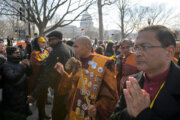Set in Vermont’s Champlain Valley, complete with scenic views of the surrounding Green Mountains and the Adirondacks, Middlebury College‘s 350-acre campus fosters a close-knit environment for the school’s 2,500-plus undergraduates. Much of that starts with the college’s honor code.
Students pledge not to lie or cheat, which means there is zero tolerance for plagiarism and that undergrads can often take exams without proctors. The whole thing helps develop “a community of respect,” says Jin-Mi Sohn, a 2018 international and global studies grad from Holbrook, New York.
With more than 45 majors, a dozen language programs and a large emphasis on writing and rhetoric, Middlebury’s academic and extracurricular offerings are especially robust for a small liberal arts college. Popular majors include economics, political science, computer science and environmental studies. Academics are rigorous, students say, but the atmosphere is more collaborative than competitive.
[Read: Consider the Cost Benefits of Private Colleges.]
The average class size of 18 and the 8:1 student-faculty ratio also help undergrads get plenty of individual attention from professors, says Mehek Naqvi, a senior psychology and religion major from Trenton, New Jersey.
Ample research opportunities are available in all disciplines. Maddie Morgan, a 2018 grad in molecular biology and biochemistry from Atherton, California, spent about 12 hours per week working with pre medical sciences professor Grace Spatafora studying a specific strand of bacteria that causes dental cavities.
Andrew Plotch, a senior international politics and economics major from Fair Lawn, New Jersey, traveled to campaign rallies all over New Hampshire leading up to the 2016 presidential primary there as part of a project with a political science professor on voter psychology. “It was a great way to experience politics [through] an academic lens,” Plotch says. About 60 percent of undergrads study abroad.
Bonding with classmates happens quickly for incoming freshmen, who choose a required first-year seminar from topics like The Women of Game of Thrones or The Philosophy of Human Rights. Seminars are capped at 15 students, and that group makes up one’s neighbors in the residential Commons.
As living learning communities, the five Commons, each housing about 500 students, host events like dinners with visiting speakers and community meals, and each has a faculty head who lives nearby. They also compete with each other in activities like the Commons Olympics. Students generally live in the Commons for two years before they can move to other residence halls, on-campus apartments, houses or themed living spaces.
[Read: Consider Living Learning Communities as a Prospective International Student.]
In between the fall and spring semesters, Middlebury offers a monthlong winter term in January, during which students take a single class that might cover a topic that’s “off the beaten path,” says Clayton Read, a junior international politics and economics major from San Francisco.
Students must complete at least two winter terms, and many find that taking one class at a time allows for “time to ski and build relationships,” says Read, who chose a winter term course on protest music and another on welfare economics that took a deep dive into health, education and child care systems in different countries.
For many, winter is also a time for celebration. The closest ski mountain is about 20 minutes away, and Middlebury’s annual Winter Carnival features NCAA ski races, along with a bonfire, a figure skating show and a ball.
[Read: U.S Colleges Host International Students Over Winter Break.]
Each February, the school also welcomes about 100 incoming first-year students called “Febs” who took time off after high school for other experiences. Plotch, for instance, taught English to kids in Ecuador before he enrolled in February 2015. Four years later, at their own February graduation celebration, the Febs ski down the trails at Middlebury’s Snow Bowl in their caps and gowns.
There is no Greek life, though undergrads can join coed social houses. Students may also get involved with more than 150 campus organizations, frequent cultural programs and events and about 30 varsity sports teams. Athletic facilities include an ice arena and golf course, and many also take advantage of nearby forests, lakes and other outdoor retreats to hike, bike, camp, fish and more.
Just up the road, the town of Middlebury draws students to its stores, art gallery, restaurants and other businesses.
More From the Vermont College Road Trip:
More from U.S. News
2 Major College Tour Mistakes to Avoid
What to Ask About College Tour Groups
3 Ways to Enhance a Virtual College Tour
Vermont College Road Trip: Middlebury College originally appeared on usnews.com







